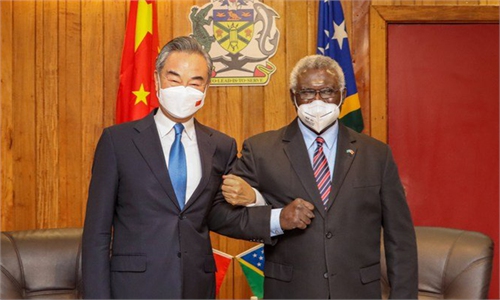
Illustration: Chen Xia/Global Times
As Chinese State Councilor and Foreign Minister Wang Yi continues a remarkable eight-country tour throughout the South Pacific, Western officials and media outlets have spared no efforts in coming up with different narratives to smear and disrupt what should be normal official exchanges between sovereign states. The latest line of attack apparently accepted by almost all major Western media outlets is that the trip has failed to achieve its goals.Some examples: In an article on Tuesday, Reuters claimed that "China [and] Pacific islands unable to reach consensus on regional pact." "China suffers setback as Pacific nations spurn broad deal," a Bloomberg article claimed on Tuesday. "China falls short on big Pacific deal," asserted an Associated Press report.
First and foremost, Wang's unprecedented trip to the South Pacific underscores China's confidence in expanding pragmatic win-win cooperation in the region, regardless of what the US and its allies think or do. Any attempt by the US or Australia to undermine such cooperation will be countered. Also, a main goal of the trip, like any official visits, is to discuss with regional partners about ways of boosting cooperation and listens to their actual needs. In that sense, it is not up to Western media outlets to judge the outcome of the talks. The fruits of the trip will eventually grow in the years ahead.
Such assertions are grossly inaccurate on multiple levels. Firstly, any fair deal between two or more parties must go through negotiations among all the parties. And such negotiations take time and efforts from all parties. How can carrying out that necessary negotiation process in a professional and respectful manner be a failure? Perhaps, the US and its allies have long been used to bullying others into signing deals on their terms that their politicians and reporters no longer know how agreements are reached properly?
Anyway, that's not how China conducts exchanges with other countries. Chinese officials, including Wang, have repeatedly stated that they will not impose anything to others. In spite of the relentless slander from Western politicians and media outlets, China actually respects other countries' choices when it comes to their own development paths and works to find areas of common interests focused on win-win cooperation. China's ever-strengthening trade and economic cooperation with South Pacific island nations in recent years, which have clearly made the US and its allies jealous and nervous, should be sufficient to attest to that.
That brings us to another problem with the Western media's assertions of China "suffering setback" with the South Pacific island nations - that is the profound bias in Western media outlets' coverage of the trip and China's ties with regional countries. Their continued deceit when it comes to certain issues designed to paint an overly negative picture and blow tiny differences out of proportion - in an attempt to drive a wedge between parties and ultimately disruption ties between China and the South Pacific island countries.
However, the problem with such a tactic is that it will not fool anybody, especially those involved parties. As a spokesperson for China's Foreign Ministry pointed out on Monday, a joint document between China and the Pacific nations involves an ongoing process of discussion all parties reached new consensus on this, making an important step towards reaching the final agreement. To any reasonable person, that sounds more like a progress rather than a "setback."
Most importantly, lies peddled by the Western media regarding the multilateral deal cannot erase or even obscure the major consensus reached by China and relevant South Pacific island nations in terms of pragmatic cooperation in economic, trade and investment fields. During Wang's interactions with regional officials, strengthening cooperation in a wide range of areas ranging from agriculture and infrastructure to climate change has been repeatedly stressed. There is no doubt that China's economic and trade ties with the countries will only be further elevated following the Chinese Foreign Minister's visit, because that is in line with the interests of regional countries.
As China's Ambassador to Papua New Guinea (PNG) Zeng Fanhua told the Global Times in a recent interview, the governments and people of Pacific island countries such as PNG are fully aware that those countries that spread the "China threat theory" have neglected the development of island countries for a long time, and they view China's rapid development as an opportunity. The US and its allies' meddling will only allow Pacific nations see their true color and become more committed to win-win cooperation with China, Zeng noted.
The bottom line is that Western officials and media outlets can quibble all they want, but there is no failure or setback but progress in China's ever-expanding ties and cooperation with willing partners in the South Pacific region.


